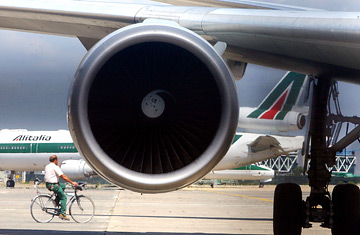
A worker pedals in between parked Alitalia passenger jets in Rome's International Leonardo Da Vinci airport
Two million euros a day. That's the amount of money Alitalia, Italy's national airline, is now hemorrhaging. That nice (or, rather, nasty) round figure succinctly quantifies just how dire the carrier's crisis has become. Alitalia's troubles are nothing new, of course, as the government-controlled company tallied some three billion euros in net losses between 1999-2006, becoming a running joke among industry insiders and a mounting burden on Italian taxpayers. Last fall, Prime Minister Romano Prodi declared the situation at Alitalia "out of control," and vowed to personally lead the search for a solution. But when the Italian Treasury eventually put most of its 49.9% share of Alitalia on the market, the terms of the sale came with so many strings attached that, one by one, all potential buyers (from U.S. private equity fund Texas Pacific to Russian carrier Aeroflot to upstart Italian airline Air One) ducked out of the bidding.
Now, with that "two-million-euro-a-day" figure (which equals about $2.7 million a day) still buzzing in the ears of government officials, investors and ordinary Italians, Alitalia is making its next move to stave off collapse. On Sep. 7, Alitalia's board is expected to finalize the details of what it is billing as a "survival/transition" plan for 2008-2010. Cynics will liken it to the allotment of a few fire extinguishers for the Hindenburg. Union officials have said that the plan calls for the company to try raise up to 1.5 billion euros in capital, cut some 1,000 of its 18,000 jobs, eliminate several of its more unprofitable routes and retire more than a dozen of its aircraft. Amidst often clashing pressures from the industry, unions and Italy's ever-unstable political climate, it is unclear whether the plan can pass muster either with the market or the ruling coalition.
As a reminder of how every step Alitalia takes comes loaded with political implications, the plan is also expected to reinstate Rome's Fiumicino airport as the airline's primary transatlantic hub, pulling flights from Milan's Malpensa airport. A decade ago, the construction of the airport 30 miles (50 km) northwest of Milan was seen as a great victory for powerful northern politicians. Now both the Milanese mayor Letizia Moratti and the governor of the Lombardy region Roberto Formigoni — both rising stars of the center-right, which is the opposition in the capital — have vowed to fight the plan. Alitalia officials will also be bracing for the reaction from the unions, who in the past have launched repeated strikes at any threat of job cuts or reductions of their generous benefits.
Still, the plan hammered out by Maurizio Prato, Alitalia's third chairman in the past year, may contain a corporate logic that goes beyond all the apparent wheel-spinning. The company, no one doubts, must be sold. The 5,000-pound vulture in the room is named Air France-KLM, which sat out this past year's round of bidding. Alitalia's initial cuts (modest as they are) to both personnel and fleet, its search for some hanging-on cash, and above all its shifting its hub southward all make it a more attractive regional partner for Air France following its merger with Dutch carrier KLM. It may turn out that playing hard to get will pay off for the French, as the Italians grow more desperate every day.
